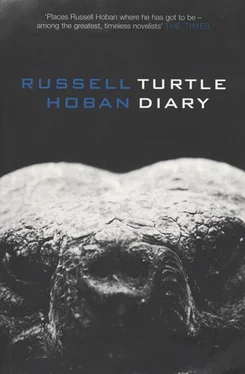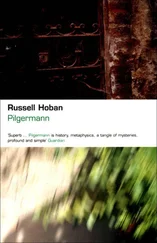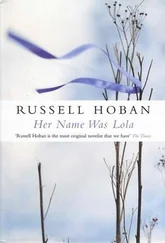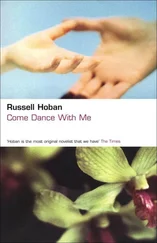Russell Hoban - Turtle Diary
Здесь есть возможность читать онлайн «Russell Hoban - Turtle Diary» весь текст электронной книги совершенно бесплатно (целиком полную версию без сокращений). В некоторых случаях можно слушать аудио, скачать через торрент в формате fb2 и присутствует краткое содержание. Год выпуска: 2000, Издательство: Bloomsbury Publishing PLC, Жанр: Современная проза, на английском языке. Описание произведения, (предисловие) а так же отзывы посетителей доступны на портале библиотеки ЛибКат.
- Название:Turtle Diary
- Автор:
- Издательство:Bloomsbury Publishing PLC
- Жанр:
- Год:2000
- ISBN:нет данных
- Рейтинг книги:3 / 5. Голосов: 1
-
Избранное:Добавить в избранное
- Отзывы:
-
Ваша оценка:
- 60
- 1
- 2
- 3
- 4
- 5
Turtle Diary: краткое содержание, описание и аннотация
Предлагаем к чтению аннотацию, описание, краткое содержание или предисловие (зависит от того, что написал сам автор книги «Turtle Diary»). Если вы не нашли необходимую информацию о книге — напишите в комментариях, мы постараемся отыскать её.
Turtle Diary — читать онлайн бесплатно полную книгу (весь текст) целиком
Ниже представлен текст книги, разбитый по страницам. Система сохранения места последней прочитанной страницы, позволяет с удобством читать онлайн бесплатно книгу «Turtle Diary», без необходимости каждый раз заново искать на чём Вы остановились. Поставьте закладку, и сможете в любой момент перейти на страницу, на которой закончили чтение.
Интервал:
Закладка:
I did last the day out. Just. In the afternoon Harriet said, ‘Will you be over this evening?’
‘Harriet …’ I said.
‘God,’ she said, ‘you sound so weary.’
‘I’m pretty thin on the ground right now,’ I said. ‘There’s not all that much of me. I need to be by myself.’
‘Well, good luck to you and all the best,’ she said, and quickly sold a Knightsbridge lady Rising Sap, by Taura Strong.
44 Neaera H
Things appear from unexpected quarters. The single dot before the face becomes another dot of different shape and density.
George Fairbairn had been a background person until now. Now he was the dot before my face, the face before my face. Knowing that I should never see the whole picture I didn’t bother to ask myself what it was.
He had seemed so medium, so unspecially placed between the top and bottom of life that I hadn’t really given him full human recognition until that evening when he brought out the champagne. I’d assumed that he was married, part of a closed circle, no lines moving on his map.
He wasn’t married. He had a flat off Haverstock Hill and that’s where I woke up on Tuesday, the morning after I’d gone to see him at the Aquarium. There was very little in the place, mostly it was furnished with light and quiet. It was on the top floor and looked out over rooftops. There was a Chinese teapot in the kitchen, there was a copy of Lilly’s The Mind of the Dolphin on the table by the bed. In the sitting room were R. H. Blyth’s four volumes on haiku and some natural history. ‘I don’t buy books much any more,’ he said. There was a radio but no gramophone.
A curious man, somewhat off to one side of things. As he said, he didn’t mind being alive but I don’t think it meant a great deal to him. I asked him nothing about himself and he offered no information, that was how it was. He had a clean look and a clean clear feel, nothing muddy. That was enough. There was about him the smell or maybe just the idea of dry grass warm in the sun.
He made breakfast for us. Looking out of the window and across a lawn I saw other people having breakfast in their windows.
‘Do you think you’ll go on doing children’s books?’ he said.
‘I don’t know,’ I said.
We left the flat. In the lift at the Belsize Park tube station there was a Dale Carnegie poster, MAXIMISE YOUR POTENTIAL, it said, and showed a drawing of a thick-faced man in simplified light and shade. He had a pencil poised in his hand and stood looking down at a graph on his desk. Whether you read the graph from his side of the desk or mine the line on it went down.
At Camden Town George kissed me and got out of the train. I went home to Madame Beetle and the snails.
45 William G
Tuesday morning. I woke up and groaned. I ached all over, and when I got out of bed I could scarcely walk. If Sandor was going to fling down the gauntlet again I didn’t know whether I had the strength to pick it up.
The bath was clean. The cooker was clean. What had happened to Sandor? He was as regular as clockwork, never overslept. Had I done him a serious injury? For a moment I hoped so, then I hoped not. I knocked on his door. No answer. I knocked again, looked at the threadbare musty carpet where my face had been the other day, heard a train go past beyond the common.
‘Who is it?’ said Sandor’s voice from inside, a little more distant than last time.
‘Me,’ I said. ‘Are you all right?’
‘Come in,’ he said. He was in bed wearing some sort of wild Islamic pyjamas. He had a sticking-plaster across his nose, his face was flushed, his moustache looked dismayed. There were stacks of foreign newspapers, a chessboard with the pieces standing on it in the middle of a game, flowers in an art nouveau vase that incorporated a naked lady. There were framed photographs of men with moustaches, sad-faced women, young Sandor in shorts and a jersey with some school team, a river with a bridge. The wallpaper was old and dark, the furniture was dark, the room had a dark and foreign smell. There was a thermometer in a glass on the bedside table.
‘Are you all right?’ I said. He looked as if he might be wearing a nightcap but wasn’t.
‘I am grotty a little,’ he said. ‘I have 39 degrees temperature, maybe a touch of influenza.’
‘Have you had breakfast?’ I said.
‘I have slightly vertigo,’ he said. ‘I stand up, room goes round, floor is slanty. Not hungry.’
‘I’ll make you some tea and toast,’ I said.
‘Not to bother,’ said Sandor. ‘I get up later.’
‘It’s no bother,’ I said.
‘Very kind of you,’ he said. ‘You are pacific this morning. You don’t make aggression.’
‘I don’t usually make aggression,’ I said. I made the tea and toast, brought it to him.
‘What do you usually have for breakfast?’ I said.
‘Half grapefruit,’ he said. ‘Seaweed, squid, coffee. Very healthy. Top protein.’
I nodded. Cookers simply have to take what comes to them, that’s life.
‘You don’t like foreigners, yes?’ he said. ‘England for the English. You don’t like foreign breakfast on cooker. Not nice, yes?’
‘I don’t dislike foreigners,’ I said. ‘You’ve got the wrong idea completely.’
‘Cobblers,’ said Sandor. ‘You make effort, put fake smile on face, make politeness. You nod hello but you don’t look at foreigner like regular human person. You look at me as if you think I carry in my briefcase nothing but sausages.’
‘What do you carry in your briefcase?’ I said.
‘Sausages and newspapers,’ he said. ‘I read and speak Hungarian, Russian, German, French, English. How many languages do you have?’
‘Only English,’ I said.
‘Wonderful,’ said Sandor. ‘Let the rest of the world learn to talk to you. You don’t waste your time with such foolishness.’
‘Maybe not,’ I said, ‘but I leave the bath and the cooker clean for the next chap, the next human person. I’d better be going now or I’ll be late for work.’
Sandor lay back on his pillow, closed his eyes. ‘Thank you for your visit,’ he said.
46 Neaera H
When I got back to my flat after leaving George Fairbairn the sky went hard and blue, the sun came out in real postcard style. I didn’t like it. Sunny days have always been more difficult for me than grey ones.
The snails grazed slowly on the sides of Madame Beetle’s tank, the little china bathing beauty turned her back on them, Madame Beetle stayed under the filter sponge. Everything seemed stupid. I walked about from room to room, took books from shelves and put them back, dug up old letters and read lines here and there.
The place seemed suddenly intolerably full of things. The cupboards were bursting with clothes and shoes I’d never wear again, the drawers were full of rubbish, the files choked with defunct correspondence.
I began to thin out my belongings, tied up clothes in bundles, stacked old newspapers, filled carrier bags with what had filled the drawers. Then I felt exhausted, had some lunch, drank coffee, smoked.
I didn’t want to be in my flat for the rest of the day. I put some paper in a file envelope and went to the British Museum. I sat on a wooden bench on the porch. Pigeons and tourists were active all round, the sunlight seemed tolerable there. I held the envelope on my lap, feeling the weight and thickness of the blank paper inside. I closed my eyes, thought of all the years of Gillian Vole, Delia Swallow and the other animals and birds I’d written about and drawn. They led such cosy cheerful lives, that lot. I’d written them but there no longer seemed a place in their world for me.
Читать дальшеИнтервал:
Закладка:
Похожие книги на «Turtle Diary»
Представляем Вашему вниманию похожие книги на «Turtle Diary» списком для выбора. Мы отобрали схожую по названию и смыслу литературу в надежде предоставить читателям больше вариантов отыскать новые, интересные, ещё непрочитанные произведения.
Обсуждение, отзывы о книге «Turtle Diary» и просто собственные мнения читателей. Оставьте ваши комментарии, напишите, что Вы думаете о произведении, его смысле или главных героях. Укажите что конкретно понравилось, а что нет, и почему Вы так считаете.












